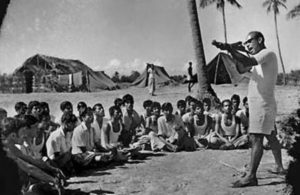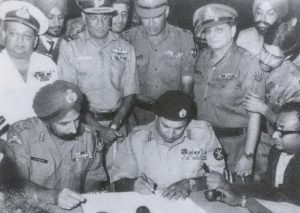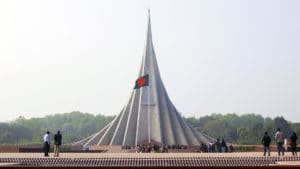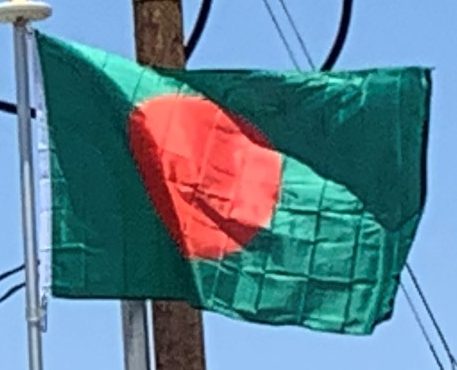
During the Bangladesh Liberation War, Bengali nationalists declared independence and formed the Mukti Bahini (the Bangladeshi National Liberation Army). The Provisional Government of Bangladesh was established on 17 April 1971, converting the 469 elected members of the Pakistani national assembly and East Pakistani provincial assembly into the Constituent Assembly of Bangladesh. The provisional government issued a proclamation that became the country’s interim constitution and declared “equality, human dignity and social justice” as its fundamental principles. Due to Mujib’s detention, the acting president was Syed Nazrul Islam, while Tajuddin Ahmad was Bangladesh’s first prime minister. The military wing of the provisional government was the Bangladesh Forces that included Mukti Bahini and other Bengali guerilla forces. Led by General M. A. G. Osmani and eleven sector commanders, the forces held the countryside during the war and conducted wide-ranging guerrilla operations against Pakistani forces. As a result, almost the entire country except the capital Dacca was liberated by Bangladesh Forces by late November. This led the Pakistan Army to attack neighboring India’s western front on 2 December. India retaliated in both the western and eastern fronts. With a joint ground advance by Bangladeshi and Indian forces, coupled with air strikes by both India and the small Bengali air contingent, the capital Dacca was liberated from Pakistani occupation in mid-December. The nine-months long war ended with the surrender of Pakistani armed forces to the Bangladesh-India Allied Forces on 16 December 1971. Under international pressure, Pakistan released Rahman from imprisonment on 8 January 1972 and he was flown by the British Royal Air Force to a million-strong homecoming in Dacca. Remaining Indian troops were withdrawn by 12 March 1972, three months after the war ended.

The cause of Bangladeshi self-determination was recognized around the world. By August 1972, the new state was recognized by 86 countries. Pakistan recognized Bangladesh in 1974 after pressure from most of the Muslim countries.
People’s Republic of Bangladesh:
The constituent assembly adopted Bangladesh’s constitution on 4 November 1972, establishing a secular, multiparty parliamentary democracy. The new constitution included references to socialism, and Prime Minister Sheikh Mujibur Rahman nationalized major industries in 1972. A major reconstruction and rehabilitation program was launched. The Awami League won the country’s first general election in 1973, securing a large majority in the Jatiyo Sangshad. Bangladesh joined the Commonwealth of Nations, the UN, the OIC and the Non-Aligned Movement, and Rahman strengthened ties with India. Amid growing agitation by the opposition National Awami Party and National Socialist Party, he became increasingly authoritarian. Rahman amended the constitution, giving himself more emergency powers (including the suspension of fundamental rights). The Bangladesh famine of 1974 also worsened the political situation.

Presidential Era and Coups (1975–1991):
In January 1975, Sheikh Mujibur Rahman introduced one-party socialist rule under BAKSAL. Rahman banned all newspapers except four state-owned publications, and amended the constitution to increase his power. He was assassinated during a coup on 15 August 1975. Martial law was declared, and the presidency passed to the usurper Khondaker Mostaq Ahmad for four months. Ahmad is widely regarded as a quisling by Bangladeshis. Tajuddin Ahmad, the nation’s first prime minister, and four other independence leaders were assassinated on 4 November 1975. Chief Justice Abu Sadat Mohammad Sayem was installed as president by the military on 6 November 1975. Bangladesh was governed by a military junta led by the Chief Martial Law Administrator for three years. In 1977, the army chief Ziaur Rahman became president. Rahman reinstated multiparty politics, privatized industries and newspapers, established BEPZA and held the country’s second general election in 1979. A semi-presidential system evolved, with the Bangladesh Nationalist Party (BNP) governing until 1982. Rahman was assassinated in 1981, and was succeeded by Vice President Abdus Sattar. Sattar received 65.5 percent of the vote in the 1981 presidential election.
